Data center networking hardware forms the backbone of modern IT infrastructure, enabling the seamless flow of data across vast networks. With the increasing demand for faster data transfer, enhanced scalability, and robust security measures, the importance of networking hardware in data centers cannot be overstated.
From switches and routers to firewalls and load balancers, these critical components ensure the efficient functioning of data centers. In this discussion, we will explore the types of networking hardware used in data centers, delve into the key components that make up data center networking hardware, and examine the significance of choosing the right switches for optimal performance.
Additionally, we will touch upon emerging trends such as software-defined networking and network virtualization that are shaping the future of data center networking hardware. So, let's dive into the world of data center networking hardware and uncover the technologies driving its evolution.
Key Takeaways
- Data center networking hardware includes switches, routers, firewalls, and load balancers.
- Networking hardware is crucial for high-speed data transfer, scalability, reliability, security, and efficiency in data centers.
- Switches and routers enable communication within the data center network, while firewalls protect against unauthorized access.
- Juniper Data Center Networking Hardware offers performance enhancements, scalability, flexibility, and enhanced security measures.
Overview of Data Center Networking Hardware
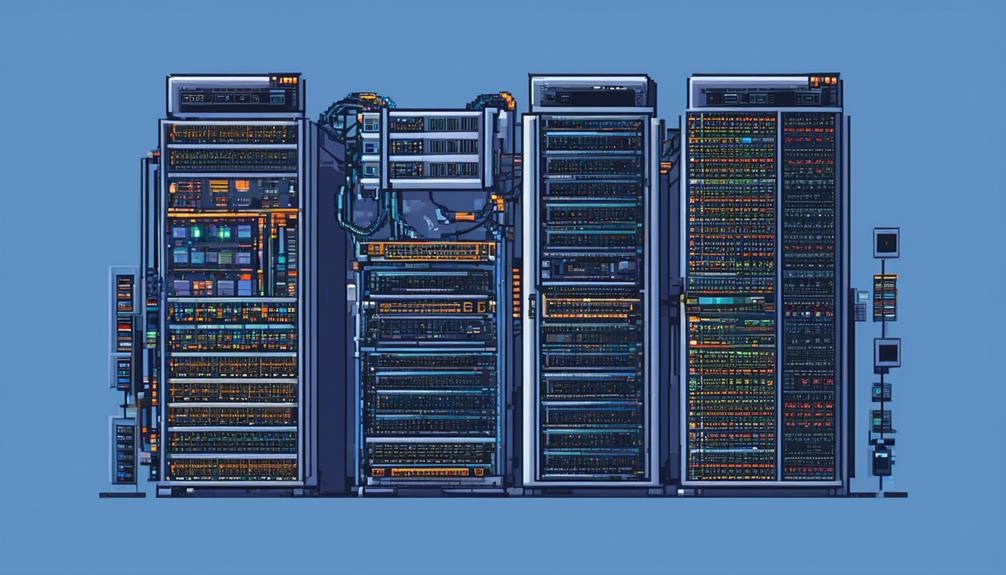
Data center networking hardware encompasses a range of interconnected devices and infrastructure designed for efficient data storage, processing, and distribution within a facility. These components are vital for the smooth operation of data centers, ensuring reliable connectivity and optimal performance.
The hardware used in data center networking can be categorized into several key components. Switches are crucial for connecting servers, storage devices, and other network equipment within the data center. They facilitate the transfer of data between devices, allowing for efficient communication.
Routers play a critical role in directing network traffic between different networks, both within and outside the data center. They help ensure that data packets are delivered to their intended destinations.
Firewalls are another essential component of data center networking hardware. They protect the network from unauthorized access and potential threats, filtering incoming and outgoing traffic based on predefined security rules.
Load balancers are responsible for distributing network traffic evenly across multiple servers, optimizing resource utilization and preventing any single server from being overwhelmed.
Security appliances, such as intrusion detection and prevention systems, are used to detect and mitigate security breaches in real-time. These devices monitor network traffic, analyze it for any suspicious or malicious activity, and take immediate action to protect the data center.
Importance of Networking Hardware in Data Centers
Networking hardware plays a pivotal role in ensuring the efficient and secure operation of data centers, enabling high-speed data transfer, low-latency communication, and scalable infrastructure. Components such as switches, routers, firewalls, load balancers, and security appliances form the backbone of data center networks, allowing for the storage, processing, and distribution of data within the facility. The importance of networking hardware in data centers cannot be overstated, as it directly impacts the performance, reliability, and security of the entire system.
To emphasize the importance of networking hardware in data centers, the following table highlights key factors and benefits:
| Factors | Benefits |
|---|---|
| High-speed data transfer | Enables rapid transmission of large volumes of data, improving overall performance and productivity |
| Low-latency communication | Reduces delays in data transmission, ensuring real-time interactions and responsiveness |
| Scalable infrastructure | Allows data centers to expand and adapt to increasing demands, supporting growth and future-proofing the facility |
| Reliability | Ensures continuous and uninterrupted operation, minimizing downtime and maximizing productivity |
| Security | Protects data and systems from unauthorized access, ensuring data confidentiality and integrity |
| Flexibility and efficiency | Enables automation, virtualization, and software-defined components, increasing agility, scalability, and resource optimization |
As data center networks continue to evolve, future trends such as software-defined networking (SDN), network virtualization, edge computing, 5G connectivity, and green data centers further highlight the importance of networking hardware. These advancements enhance the capabilities of data centers, enabling them to handle the increasing demands of modern technologies and applications.
Types of Networking Hardware for Data Centers
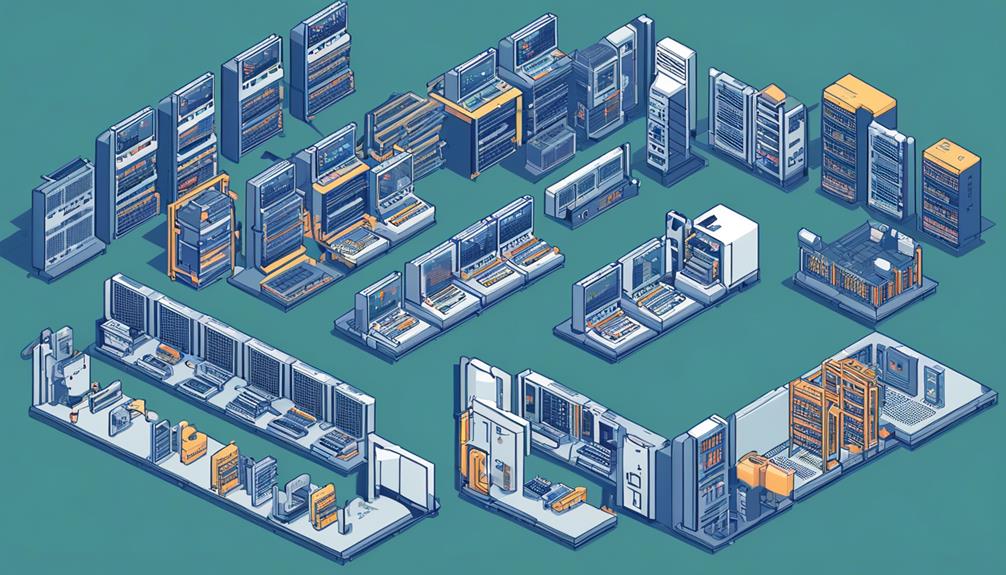
When it comes to networking hardware in data centers, three key components are switches, routers, and firewalls.
Switches are responsible for connecting devices within the data center network, allowing for efficient data transfer.
Routers enable communication between different networks, ensuring data is delivered to the correct destination.
Firewalls play a crucial role in network security, protecting the data center from unauthorized access and potential threats.
These components form the foundation of a robust and secure data center network.
Switches
Switches are a critical component of data center networks, facilitating efficient and reliable communication between connected devices by directing data traffic. These networking devices are essential for creating local area networks (LANs) within data centers, enabling high-speed data transfer and low-latency communication among devices in a confined area.
There are various types of switches available for different networking needs, including Ethernet switches, Fibre Channel switches for storage area networks, and software-defined switches for centralized management and programmability. Selecting the right type of switch is crucial for ensuring efficient data transfer and connectivity within a data center network.
Modern data center networks also leverage software-defined switches, which offer increased flexibility, automation, and centralized management capabilities. Notable manufacturers of data center switches include Extreme Networks, which provides top-of-rack (TOR) switches that support load balancing and efficient network management.
Routers
Routers play a crucial role in data center networks by connecting different networks and facilitating the transfer of data between them. They are an essential piece of networking equipment in data centers, enabling the creation of Local Area Networks (LANs) within a single building or campus.
Routers also establish Wide Area Networks (WANs) that span larger geographic areas, connecting multiple data centers or remote locations. Additionally, routers are used in Storage Area Networks (SANs) to provide high-speed storage connectivity for servers and storage systems within data centers.
They are also utilized in Virtual Private Networks (VPNs) to securely connect remote users or sites to the data center network over the internet. Routers are a fundamental component of data center network architecture, ensuring efficient and reliable data transfer.
Firewalls
Firewalls are essential components of data center networks, providing crucial security by monitoring and controlling incoming and outgoing network traffic.
There are two main types of firewalls: hardware firewalls and software firewalls.
Hardware firewalls, such as those offered by NSX Data Center, are physical devices that filter traffic between different networks. They offer robust protection at the network perimeter and can be integrated with other networking solutions for centralized management and full-stack networking.
Software firewalls, on the other hand, protect individual devices within the data center. Next-generation firewalls (NGFW) go beyond traditional firewalls by incorporating integrated security controls such as intrusion prevention, deep packet inspection, and application awareness.
Firewalls play a significant role in safeguarding data center networks by enforcing security policies, preventing unauthorized access, and mitigating potential cyber threats.
Key Components of Data Center Networking Hardware
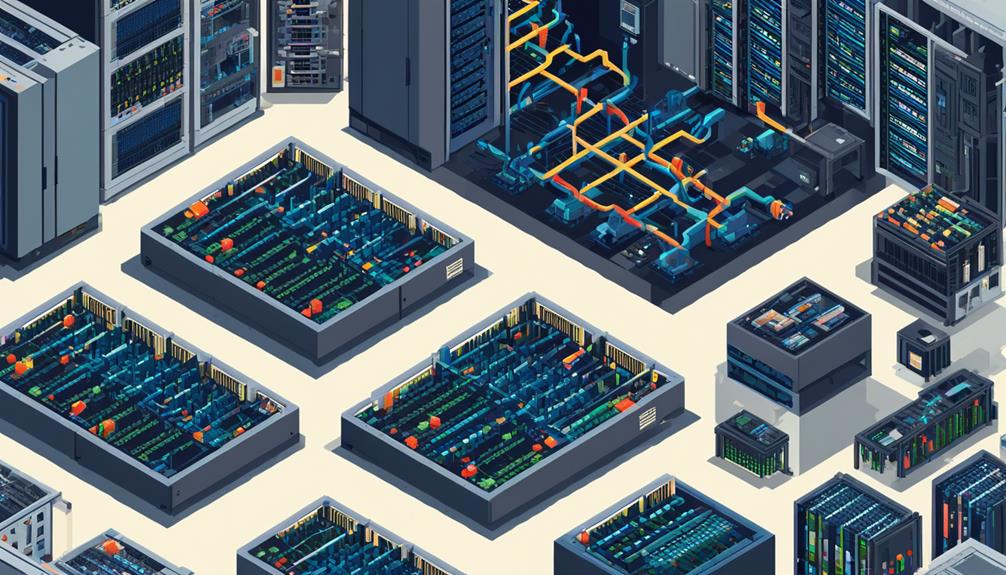
The key components of data center networking hardware include:
- Switches and routers: These are responsible for directing network traffic and enabling communication between devices within the data center.
- Network interface cards: These provide the necessary connectivity between servers and the network infrastructure.
- Cables and connectors: These ensure reliable and high-speed data transmission within the data center environment.
These components form the foundation of a robust and efficient data center network.
Switches and Routers
Switches and routers are essential components of data center networking hardware, playing a crucial role in facilitating efficient and secure communication between devices within the data center facility. Here are some key facts about switches and routers in the context of data center networking:
- Switches direct data traffic within the data center, enabling seamless communication between devices.
- Routers create and manage local area networks (LANs) and wide area networks (WANs) within the data center, ensuring connectivity and data transmission.
- These components are vital for high-speed data transfer, low-latency communication, and secure network connectivity in a data center environment.
- Selecting the right switches and routers is crucial for handling large volumes of data and maintaining reliable connections in a data center.
Switches and routers are the backbone of data center networking, providing the necessary infrastructure for efficient and secure data transfer and communication within the facility.
Network Interface Cards
Network Interface Cards (NICs) are vital components of data center networking hardware. They enable seamless connectivity and communication between devices within the data center facility. NICs provide the physical interfaces, such as Ethernet ports, that allow servers, storage systems, and other network devices to connect to the network.
NICs play a crucial role in data transfer, ensuring high-speed and reliable connectivity between different components of the data center network. They are available in various types, including copper and fiber interfaces, to accommodate different network infrastructure and connectivity requirements.
Moreover, NICs support advanced features like virtualization, offloading network processing tasks, and providing secure connections. These features contribute to the overall performance and security of the data center network.
In the event of network issues, troubleshooting network interface cards can help diagnose and resolve problems. This ensures uninterrupted data services and optimal utilization of networking resources.
Cables and Connectors
Cables and connectors play a critical role in data center networking hardware. They serve as the physical conduits that enable seamless connections between various networking devices and infrastructure. Here are some key aspects to consider when it comes to cables and connectors in data center networking:
- Fiber optic cables are commonly used for high-speed, long-distance connections, while copper cables are preferred for shorter distances and cost-effectiveness.
- Connectors such as LC, SC, and MPO are widely used for terminating fiber optic cables. These connectors ensure reliable and efficient connections.
- Cable management systems are crucial for organizing and maintaining the vast network of cables in data center networking. They ensure accessibility, maintenance, and troubleshooting efficiency.
- Choosing the right cables and connectors is essential as it directly impacts the performance, reliability, and scalability of the network infrastructure.
Choosing the Right Switches for Data Center Networking
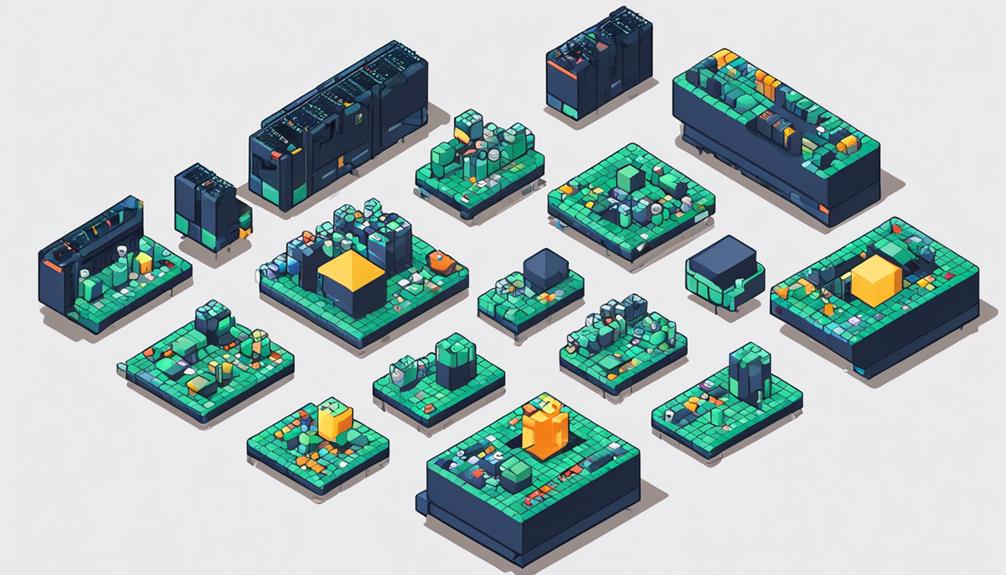
To ensure optimal performance and security in your data center, selecting switches that meet the scalability, performance, and advanced security requirements is crucial. When choosing switches for data center networking, there are several factors to consider.
Firstly, it is important to evaluate the scalability and performance requirements of your data center. Look for switches that can handle the increasing traffic and growth effectively. Consider the need for high-speed connectivity and low-latency communication, especially for storage area networks (SAN) and data-intensive applications.
Secondly, advanced security features are essential to safeguard sensitive data. Opt for switches that offer features such as access control lists, VLAN segmentation, and encryption. These security measures help protect against unauthorized access and data breaches.
Additionally, consider switches with features like Quality of Service (QoS) and traffic prioritization. These features optimize the performance of critical applications by ensuring that they receive the necessary bandwidth and resources.
Moreover, compatibility with existing network infrastructure is important. Choose switches that seamlessly integrate with your current hardware and software. Also, consider future technologies such as software-defined networking (SDN) which provide enhanced flexibility and management capabilities.
Understanding the Role of Routers in Data Center Networking
Routers serve a crucial role in data center networking by facilitating the efficient and reliable flow of data between different networks and enabling seamless connectivity within and outside the data center. Here are the key points to understand about the role of routers in data center networking:
- Traffic Direction: Routers are responsible for directing traffic between different networks in a data center. They determine the best path for data transmission, optimizing efficiency and reliability. This ensures that data reaches its intended destination quickly and without delay.
- External Connectivity: Routers play a critical role in connecting the data center to external networks such as the internet and other data centers. They enable communication between devices in the data center and devices located outside, allowing for seamless data exchange.
- Routing Protocols: Routers use routing protocols to make decisions about how data should be transmitted. These protocols gather information about network topology, traffic load, and other factors to determine the most efficient path for data transmission. This helps to minimize congestion and maximize network performance.
- Hierarchical Deployment: In large data centers, routers may be deployed in a hierarchical structure to manage the flow of data between different layers of the network. This helps to organize and streamline the network, improving overall performance and scalability.
Understanding the role of routers in data center networking is essential for optimizing network performance and ensuring seamless connectivity within and outside the data center. By efficiently directing traffic, connecting to external networks, utilizing routing protocols, and deploying in a hierarchical structure, routers play a vital role in the smooth and reliable operation of data centers.
Benefits of Juniper Data Center Networking Hardware
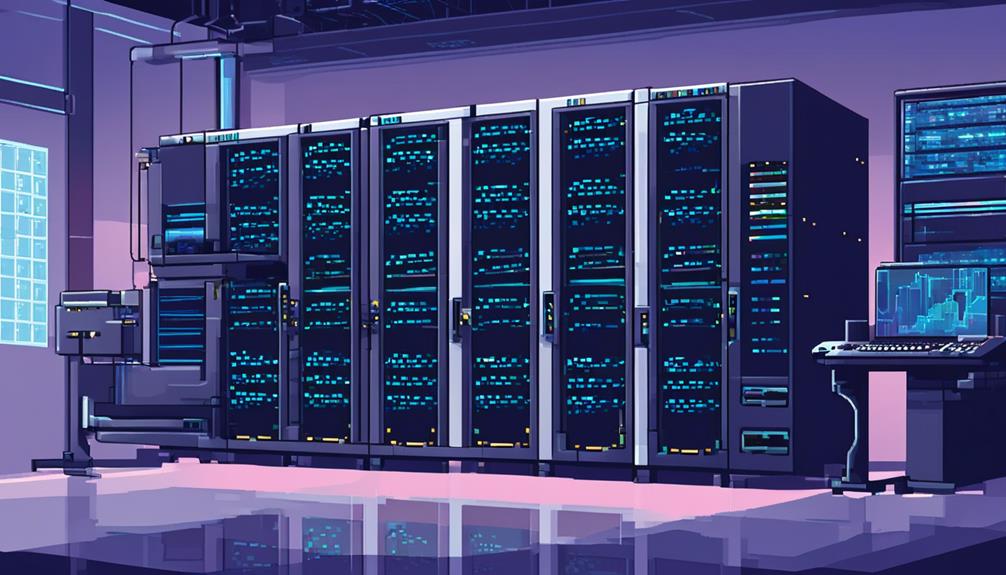
Juniper Data Center Networking Hardware offers significant benefits in terms of performance enhancements, scalability, flexibility, and enhanced security measures.
With its high-performance capabilities, it ensures fast data transfer and low-latency communication, meeting the demands of data-intensive applications.
The hardware's scalability allows for accommodating the growing needs of businesses, while its robust security measures protect sensitive data and prevent unauthorized access.
Performance Enhancements
With its focus on high performance, Juniper's data center networking hardware offers a range of performance enhancements that enable fast data transfer, low-latency communication, and efficient processing. These enhancements are crucial for optimizing the performance of data center networks and ensuring smooth operation of data-intensive applications.
Here are four key performance enhancements provided by Juniper's data center networking hardware:
- Scalability: Juniper hardware allows for seamless scalability, ensuring optimal performance as the network grows and accommodating the increasing demands of data-intensive applications.
- Reliability and Redundancy: Juniper hardware is designed with built-in redundancy and failover mechanisms, minimizing downtime and ensuring continuous operation for enhanced reliability.
- Security: Juniper hardware implements advanced security measures to protect sensitive data and prevent unauthorized access, offering a secure and resilient data center network environment.
- Cost Efficiency: Juniper hardware contributes to reducing operational costs, energy consumption, and overall IT expenses while delivering top-notch performance enhancements.
These performance enhancements make Juniper's data center networking hardware a reliable and efficient choice for organizations looking to optimize their data center networks.
Scalability and Flexibility
Scalability and flexibility are key benefits offered by Juniper's data center networking hardware. This hardware allows organizations to easily adapt and expand their network configurations to meet the growing demands of data-intensive applications.
Juniper's hardware provides scalability by enabling organizations to increase their network capacity and performance as needed. This ensures smooth operation even during peak traffic.
The flexibility of Juniper's hardware allows for agile network configurations. This enables organizations to quickly respond to changing business requirements. The flexibility also extends to the ability to seamlessly integrate with other network components and technologies.
Moreover, Juniper's data center networking hardware ensures reliability and redundancy through built-in mechanisms. This ensures continuous operation and minimizes downtime.
Enhanced Security Measures
Enhanced security measures are a key benefit of Juniper's data center networking hardware. These measures provide robust protection against cyber threats and ensure the integrity and confidentiality of data.
Juniper's networking solutions offer advanced threat prevention capabilities. This helps safeguard against malicious activities and potential breaches.
With secure access control mechanisms and encryption protocols, unauthorized access and data interception are prevented.
Additionally, Juniper's data center networking hardware includes built-in intrusion detection and prevention features. These features enhance the ability to proactively identify and mitigate potential security risks.
These comprehensive security measures not only protect sensitive data but also contribute to compliance with industry regulations and standards.
Juniper's commitment to security virtualization and network services instills confidence in the protection of data within the data center environment.
Exploring Junos OS for Data Center Networking
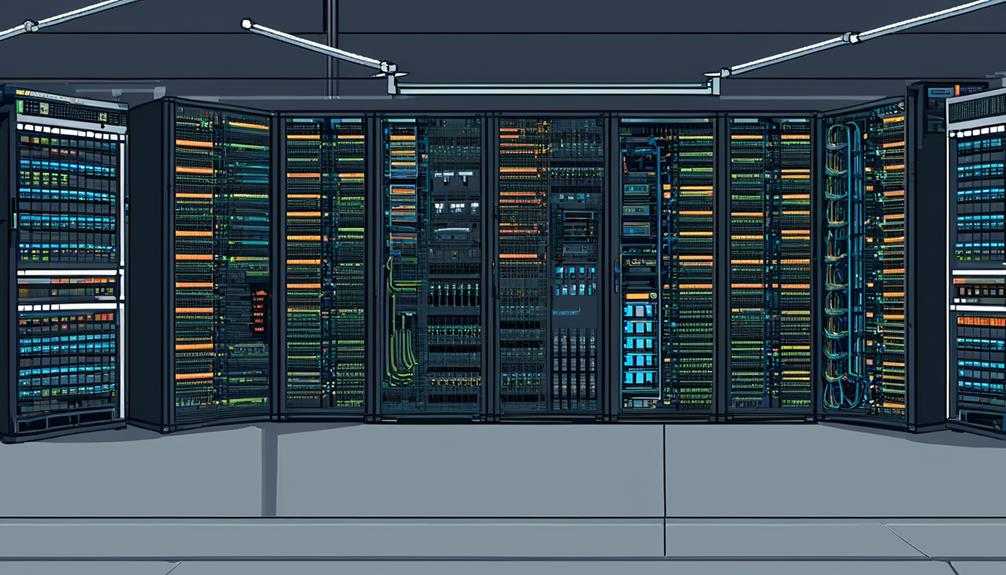
Junos OS, the network operating system developed by Juniper Networks, offers a wide range of capabilities for exploring data center networking, enabling the creation of high-performance, secure, and agile network infrastructures. It is designed to meet the demands of modern data centers, providing features like automation, programmability, and analytics to simplify network operations and efficiently manage large-scale environments.
One of the key strengths of Junos OS is its support for various networking protocols and standards, allowing seamless integration and interoperability within complex data center networks. This enables organizations to leverage existing infrastructure investments while adopting new technologies. Junos OS's modular architecture also facilitates the deployment of advanced services and applications, making it suitable for evolving data center requirements and innovative networking solutions.
To provide a clearer picture of Junos OS's capabilities, let's explore some of its key features in the context of data center networking:
| Feature | Description |
|---|---|
| Security Virtualization | Junos OS enables the isolation of network resources, ensuring that data packets are securely transmitted. |
| Cloud Storage | It supports the integration of cloud storage solutions, allowing seamless data transfer and access control. |
| Access Control | Junos OS provides robust access control mechanisms, ensuring only authorized users can access the network. |
Introduction to Data Center Fabrics and EVPN-VXLAN
In the context of data center networking, understanding the concept of data center fabrics and the role of EVPN-VXLAN is crucial for building efficient and secure overlay networks.
EVPN-VXLAN is a data center fabric architecture that combines Ethernet VPN (EVPN) and Virtual Extensible LAN (VXLAN) technologies to provide a flexible and secure overlay network for connecting resources in a data center.
Here are some key points to consider:
- EVPN-VXLAN simplifies network provisioning and management by decoupling the logical network from the underlying physical infrastructure. This allows for more efficient use of networking resources and enables seamless data center network scalability and agility.
- With EVPN-VXLAN, virtual machines can be seamlessly moved across data center racks and locations while maintaining consistent connectivity and policies. This enhances workload mobility and enables flexible resource allocation in dynamic data center environments.
- By leveraging EVPN-VXLAN, data center operators can achieve networking and security virtualization, which allows for the isolation and segmentation of traffic within the overlay network. This ensures that different tenants or applications can operate in their own virtual network, enhancing security and performance.
- EVPN-VXLAN enhances data center network scalability and agility, supporting modern application and workload requirements. It enables the creation of large-scale overlay networks that can span multiple data centers, providing a seamless and scalable infrastructure for connecting resources.
Enhancing Data Center Performance With Networking Hardware
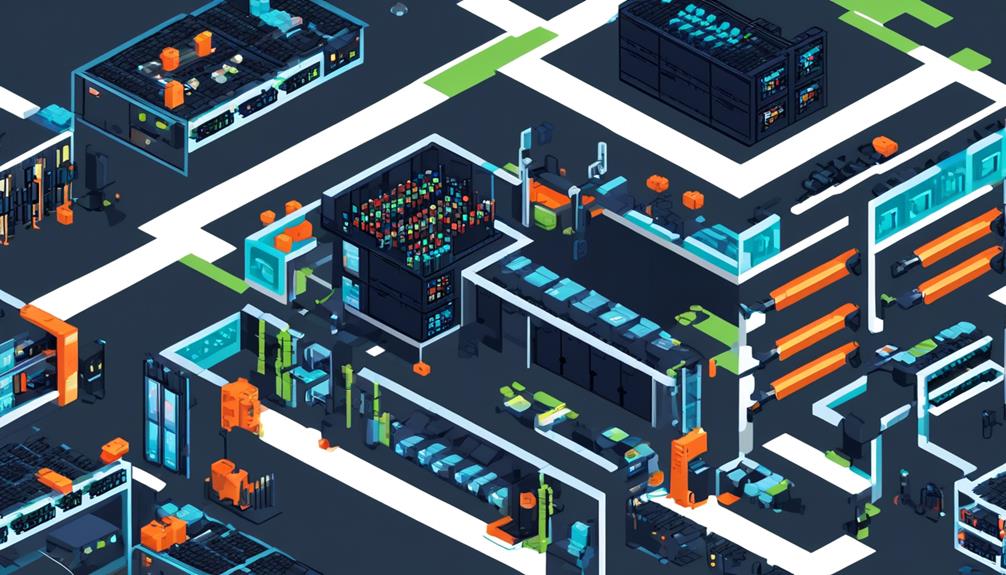
Optimizing data transfer speeds and reducing communication latency within the data center network is crucial for enhancing data center performance. This can be achieved through the implementation of advanced networking hardware.
Data center networking hardware plays a vital role in ensuring the critical speed and agility required to meet the ever-increasing demands of data-intensive applications. By leveraging the right networking solutions, data centers can establish an efficient network infrastructure that enables seamless communication and data exchange.
One of the key benefits of utilizing advanced networking hardware is scalability. As data centers continue to grow, networking hardware that supports high-speed connectivity and can handle large volumes of traffic becomes essential. This scalability ensures that the network can accommodate the increasing demands placed on it by data-intensive applications, without compromising performance.
Reliability and redundancy are also critical factors in enhancing data center performance. Advanced networking hardware incorporates built-in failover mechanisms that ensure continuous operation even in the event of a component failure. This redundancy not only improves data center uptime but also contributes to a more stable and dependable network infrastructure.
Security is another crucial aspect that can be enhanced through the use of networking hardware. With the rise in cyber threats, data centers need robust security measures to safeguard sensitive data and prevent unauthorized access. Networking hardware can provide features like encryption, firewall protection, and intrusion detection systems, which significantly enhance the overall security posture of the data center.
Furthermore, efficient use of physical space is a fundamental consideration in data center design. Networking hardware that offers high port density and compact form factors allows for better utilization of rack space, maximizing the efficiency and density of the data center infrastructure.
Future Trends in Data Center Networking Hardware
As the landscape of data center networking continues to evolve, future trends in networking hardware are poised to shape the way data centers operate and meet the demands of data-intensive applications. Here are four key trends that are expected to drive the development of data center networking hardware:
- Software-Defined Networking (SDN): SDN offers a flexible and programmable approach to network management, allowing data center operators to centrally control and automate network configurations. This trend enables agile network architectures that can adapt to changing requirements, improving scalability and reducing operational costs.
- Network Virtualization: With the increasing need for isolation and scalability, network virtualization is becoming prominent in data centers. It enables the creation of virtual networks within a physical network infrastructure, allowing multiple virtual networks to coexist and be managed independently. This trend enhances resource utilization and simplifies network management, leading to improved efficiency and agility.
- Edge Computing: As the volume of data from IoT devices continues to grow, data center networking hardware is being designed to support edge computing. Edge computing shifts processing closer to the network edge, reducing latency and improving real-time data analysis. This trend requires networking solutions that can handle the distributed nature of edge computing, ensuring seamless connectivity and efficient data transfer between edge devices and the data center.
- 5G Connectivity: The rollout of 5G networks brings high-speed, low-latency connectivity, which will have a significant impact on data center networking. With faster and more reliable connections, data centers can handle the increased demand for mobile data and support emerging technologies like autonomous vehicles and augmented reality. Networking hardware will need to incorporate 5G capabilities, such as improved network interfaces and higher power supply, to fully leverage the potential of this technology.
Frequently Asked Questions
What Hardware Is Used in Data Centers?
Data center hardware encompasses a range of equipment dedicated to supporting the operations of a data center. This includes data center switches, routers, firewalls, load balancers, storage devices, and servers.
These components are essential for creating a robust and secure network infrastructure within the data center environment. Data center switches facilitate communication between devices, routers enable network connectivity, firewalls ensure network security, load balancers distribute network traffic, and storage devices and servers handle data storage and processing tasks.
What Are the Network Equipment Used in Data Center?
Network equipment used in data centers includes:
- Network switches: essential for connecting devices within the data center and managing the flow of data.
- Router configurations: enable efficient routing of data between networks.
- Network security appliances: ensure the protection of valuable data and systems from unauthorized access.
- Load balancers: distribute network traffic across multiple servers for improved performance.
- Fiber optic cables: provide high-speed and reliable connectivity.
- Network monitoring tools: allow for proactive monitoring and troubleshooting of network issues.
What Are the 3 Main Components of a Data Center Infrastructure?
Data center infrastructure comprises three key components: computing equipment, networking hardware, and storage devices.
Computing equipment, including servers and virtualization technology, facilitates data processing and resource optimization.
Networking hardware, such as switches, routers, and firewalls, enables efficient data transfer and communication within the data center.
Storage devices, including HDDs, SSDs, and SAN solutions, store and manage data.
These components, together with data center architecture, virtualization techniques, power and cooling systems, storage infrastructure, security measures, and scalability and high availability, ensure the efficient and secure operation of a data center.
What Is Networking in a Datacenter?
Networking in a datacenter refers to the interconnection of devices and infrastructure that enable the storage, processing, and distribution of data within the facility. It plays a crucial role in facilitating communication, data transfer, and resource sharing among various components of the data center network. Benefits of networking in a datacenter include improved performance, scalability, reliability, and cost efficiency. However, network security is of utmost importance in data centers to protect sensitive data and prevent unauthorized access.
Managing data center networks can be challenging due to the complexity and scale involved, requiring careful planning and monitoring. Scalability is another key consideration for designing a data center network, as it must be able to accommodate the increasing demands of data-intensive applications.
Future trends in data center networking include software-defined networking, network virtualization, edge computing, 5G connectivity, and green data centers, indicating a shift towards flexibility, sustainability, and enhanced capabilities.